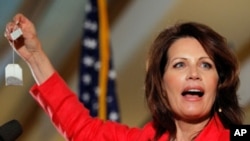As U.S. political leaders struggle to find a compromise to raise the national debt limit by next Tuesday, voters and analysts alike are blaming hyper-partisan politics for the impasse. Sharp political differences have always been a feature of American democracy, but historically the country has generally found a way to compromise.
Around the country, voters are tired of the debt stalemate in Washington and are urging both sides to compromise.
“Going to the edge of a cliff may be exciting for some people, but it does not make sense for a way of running the country,” one man said. "I think it is almost like a spoiled child, ‘I have either got to have my way or it is no way!,” a woman said.
Some Americans are asking whether polarized politics has made the United States ungovernable.
Democrats control the White House and the Senate, but Republicans hold a majority in the House of Representatives.
Even President Barack Obama expressed frustration in a recent speech to the nation. “The American people may have voted for divided government, but they did not vote for a dysfunctional government,” Mr. Obama said.
But the political battle lines over raising the debt ceiling so the United States can meet its obligations remain rigid.
Many Republicans say the voters who sent them to Washington are demanding they shrink the size of government and will hold them accountable in next year’s election if they fail.
Minnesota Congresswoman Michele Bachmann is a favorite of small government activists in the Tea Party movement and a candidate for the Republican Party’s presidential nomination next year.
“Mr. President, do not raise the debt ceiling. They are tired of Washington, D.C. not listening to them and they are tired of how out of touch the politicians are who say we have to continue the spending,” Bachman said.
Many analysts see the debt fight as the latest example of a growing U.S. political polarization, a trend that has been building for decades.
Professor David Lublin teaches government at American University in Washington. “Now the two parties are in fact more polarized, and I think that is largely being driven by our party primary process, where it is increasingly hard to get nominated for one of the two parties if you are a moderate,” Lublin said.
With fewer moderates in both major political parties, finding a sweet spot in the center to forge a compromise on divisive issues has become increasingly complicated.
Historian Doris Kearns Goodwin told NBC News the focus on partisanship has eroded the traditional ability of Democrats and Republicans in Congress to get along with one another.
“In earlier days legislators would socialize together on the weekends. They would play poker, they would drink, they would share stories and created friendships that went across party lines,” Kearns said.
Former Republican senator Trent Lott told ABC’s This Week program that newly elected members of Congress seem less willing to compromise.
“I remember when I first came to the House [of Representatives], my attitude was I wanted it my way or not at all. And over the years I found out that if you take that attitude what you get is nothing,” Lott said.
Lott served for a time as Senate Republican leader and often found a way to compromise with his Democratic counterpart, former senator Tom Daschle, who also appeared on the program.
“You have got to, at some point, put governance ahead of ideology and when that happens we get the best result of good leadership in America,” Daschle said.
Political strategist Matthew Dowd says voters are angry and will hold all parties responsible in next year’s election if Congress and the president fail to come to an agreement on the debt ceiling.
“Basically the country thinks that Washington has become a cesspool of dysfunction and there seems to be a great inability of anybody to sit down and act like adults in the room and solve the problems,” Dowd said.
Public-opinion polls show most Americans want Congress to compromise on the debt issue and focus instead on creating jobs and growing the U.S. economy.
Debt Debate Driven By Polarized US Politics




